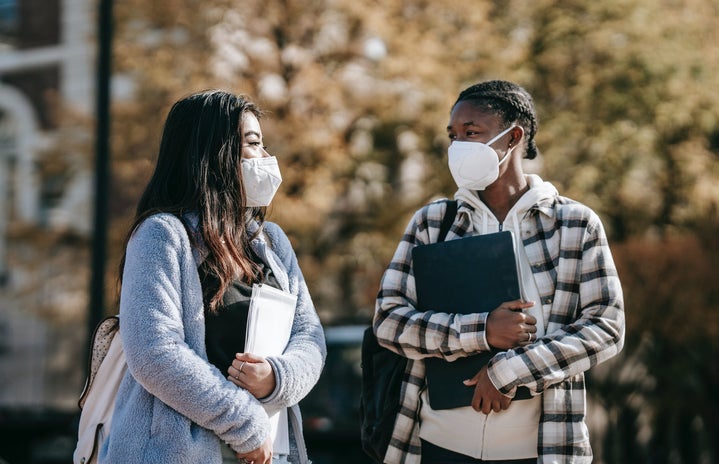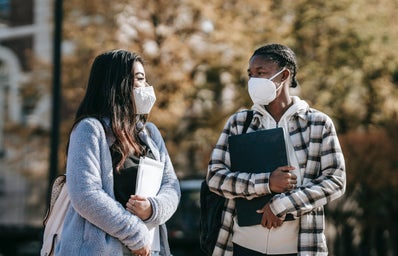For some unnecessary reason, the issue of COVID prevention has been made political with the assumption being that people who are anti-mask and anti-COVID vaccine are on the right side of the political spectrum and people who take COVID pre-cautions and encourage the use of masks and mask mandates are on the left. This article is not a political statement; rather, it is a statement on the importance of public health and the importance that all student voices and concerns receive recognition and power. The recent article published by the O’Colly OSU student newspaper, “Enough is Enough,” written by the Editor in Chief Maddison Farris, does not bring either of these things into consideration. This article, centering around the claim that OSU’s COVID policies are a “loophole” to require masks in classrooms, and that this is “discrimination” and utilized to force control over students’ bodies, refuses to acknowledge the actual reasoning behind OSU’s policies or give voices to OSU’s vulnerable population of students. In Farris’s article, students’ fears are not given a spotlight, and instead, Farris abuses her position of power as Editor in Chief to make her voice the loudest one heard by publishing two pieces on her opinion since classes began. Not only does she do this, but she later made a tweet linking her article and tagging right-wing extremist politicians, commentators, and organizations such as Ben Shapiro and PragerU. Although this tweet has since been deleted, her motivations are still clear.
In order to account for the shortcomings of Farris’s article, I have decided to write a response that addresses what she says as well as highlight the voices of other students on campus whose feelings are drastically different from her claims.
First, it feels necessary to address Farris’s original claim of getting kicked out of class for refusing to wear a mask. Farris writes, “Last week I was kicked out of a classroom for not wearing a mask. Is this really what Oklahoma State has come to? When I was offered one by the professor, I shook my head no and was told to leave. I left without saying a word.” She uses this experience to then describe the emotions that she felt following it where she was flooded with disbelief because she felt like her rights had been violated. However, Farris fails to include that the professor that told her to leave was also a breast cancer survivor of five years who is high risk for COVID and had previously had to “pretty much beg” students to wear masks. Instead of this being seen as a method of protection, Farris likens it to discrimination saying “The school may think that they are avoiding legal consequences by putting the ‘authority’ for mask requirements in the hands of the professors, but the discrimination that has already occurred is a major cause for concern when it comes to future repercussions.” This omission changes the gravity and tone of the situation Farris was actually in when she was asked to leave class. Who holds more power in the situation Farris depicts: a student who refuses to wear a mask or a cancer survivor with a compromised immune system?
Farris further distorts the motivations for masks in classes with COVID positive cases by stating, “But it is more than a mask. It’s control. It’s control over my choices, desires and body. I will not allow any institution to take away my right to decide for myself what is best and to make my own decisions, or to take away the rights and decisions of others.” She states this as fact while ignoring the implications of her actions. Mask wearing is not just for personal protection. The primary importance mask mandates or mask wearing in general is for the protection of others—specifically, vulnerable populations that cannot protect themselves. There are many comparisons that can be made to public health measures that we follow without blinking an eye in order to protect others. For example, we no longer allow indoor smoking because second-hand smoke poses a health risk to other patrons, and we require shoes indoor public and private institutions to limit the spread of disease. Given the lack of outrage over these required policies, the claim that mask requirements are about controlling one’s body falls flat. It is a red herring argument meant to distract us from the actual issue of public health. Inconvenience is sometimes necessary to protect other people, but until COVID was turned into a political issue, we all silently complied with those inconveniences in order to protect our overall health in society.
Additionally, it feels necessary to explain the factual inaccuracies that were stated in Farris’s article which the O’Colly editorial team addressed in a correction they released shortly after the article was published. Also, the OSU A&S faculty were informed by A&S Dean Glen Krutz that the removal of students who failed to comply with the new rules were completely legally within their rights. In this email, Dean Glen Krutz stated:
“OSU administrators have been in communication with the Governor’s office and legislative leadership. We are confident the change in approach is both within the bounds of the law and necessary to protect the health of the campus community.”
Next, and most importantly, Farris’s article gives a slanted view of how students are reacting to OSU policies. Farris addresses students stating, “Your voice, the student voice, is loud. It can be heard. There is strength in numbers and the students outnumber the faculty by a great deal.” Farris is right. Student voices are loud and important, but she fails to actually represent all student voices. She purposefully does not address the issue of student health and the concerns that students have regarding the disrespect they experience from other students who do not follow the fairly lax rules placed in classrooms by OSU administration. She also ignores the disappointment these students have in OSU as a whole from not implementing STRICTER COVID protocols. However, to respect Farris’s accurate claim that student’s voices ought to be heard, I’ve decided to share student’s quotes from an anonymous Google Forms survey conducted by the COVID action group on campus.
In this survey, there were several concerns about students feeling like their own actions are not enough to protect themselves and their loved ones from becoming ill. Farris frames her anti-mask argument as personal choice but does not address how her personal decisions affect others’ physical and mental wellbeing. Students have reported “I have felt that no matter what precautions I take I am unsafe. […] It is frustrating being one of a handful of students wearing a mask and seeing others have a complete disregard for how they affect those around them.” Additionally, students vent their frustration that others have politicized health issues, leaving everyone susceptible to COVID. One student said “The vaccine has become a political argument, as has masking, which leaves people who choose to protect themselves and their peers vulnerable, even though they are taking all the right steps.”
Farris’s high claim of OSU’s current COVID precautions being discriminatory and too controlling also overshadows the students on campus that are unable to feel safe unless OSU enforces stricter and more responsible COVID protocols. Students have explained that they “feel that more should be done with the guidelines” because Stillwater’s cases are drastically increasing and the mayor’s declaration of a state of emergency due to the lack of ICU beds and hospital staff available make them “not feel safe.” Even when students do everything within their power to prevent themselves from contracting COVID, immunocompromised and otherwise high-risk students explained that they feel it is not enough, and they are forced to rely on other people also engaging in precautions in order to feel protected. One student explained, “I am aware that the vaccine decreases my chances of becoming severely ill, but I also have asthma. This worries me that even with the vaccine I could have more complications.” Other students that desire more COVID precautions in the classroom have suggested socially distancing desks, stopping professors from requiring group assignments, making cleaning supplies readily available to students, and requiring online options for students.
Additionally, the mental health and academic success of all students is not valued by Farris’s article as shown by her lack of attention to how concerned students are affected when they feel they are at risk of becoming infected. Several students expressed not being able to go home to their families out of fear of spreading the virus to them and that this decreases their wellbeing sharing statements like “I couldn’t see my family from fear of exposing my high risk parents which was really hard on my mental health” and “I want to go home to see my family but I don’t feel very safe doing so due to the lack of student wearing masks in classes. I don’t want to get my family sick but don’t know how to properly avoid it when I am vaccinated and wearing my mask.”
Lastly, not only does Farris’s false claim of discrimination insult marginalized students that have experienced discrimination due to their race, class, gender, sexuality, and more, but it also disrespects COVID conscious students’ experiences in the classroom. Students express inability to stay focused when the majority of their classmates are unmasked as their “mind tends to fixate on the fear of the spread of covid.” Sometimes, students are also insulted and ridiculed by fellow classmates when they express their concern or even wear a mask to class. One student reported, “I have been treated poorly by other peers because I wear my mask in class. I’ve been told ‘Take that S*** off’ and ‘Imagine wearing a mask to class’. I’ve also had others purposely not work with me on group projects because I believe in wearing a mask. It made my anxiety worse, and I try to do my classes online now because of how rude people have been to me. I don’t feel safe at this school.” Surely, we can say that this experience more accurately mirrors discrimination than the situation Farris details in her article.
While the opinions and quotes I used here also do not represent OSU’s student population as a whole, they do help represent OSU’s most vulnerable population. COVID has been politicized, and I do not foresee that changing despite how much I and others want it to, but moving forward, we need to actively raise up the voices of students who are unable to do enough on their own to protect their own safety and the safety of others. If we at OSU are a truly a community that cares about students and each other, we must start acting like one. In the end, we all want the same thing—to prosper and enjoy our time here at Oklahoma State University, and in order to equally achieve that goal, we need to take others into consideration when deciding on our actions. So just wear the mask.


